If you're wondering how to stop puppy biting, this blog will teach you how to effectively stop this behavior without force or harsh leadership.
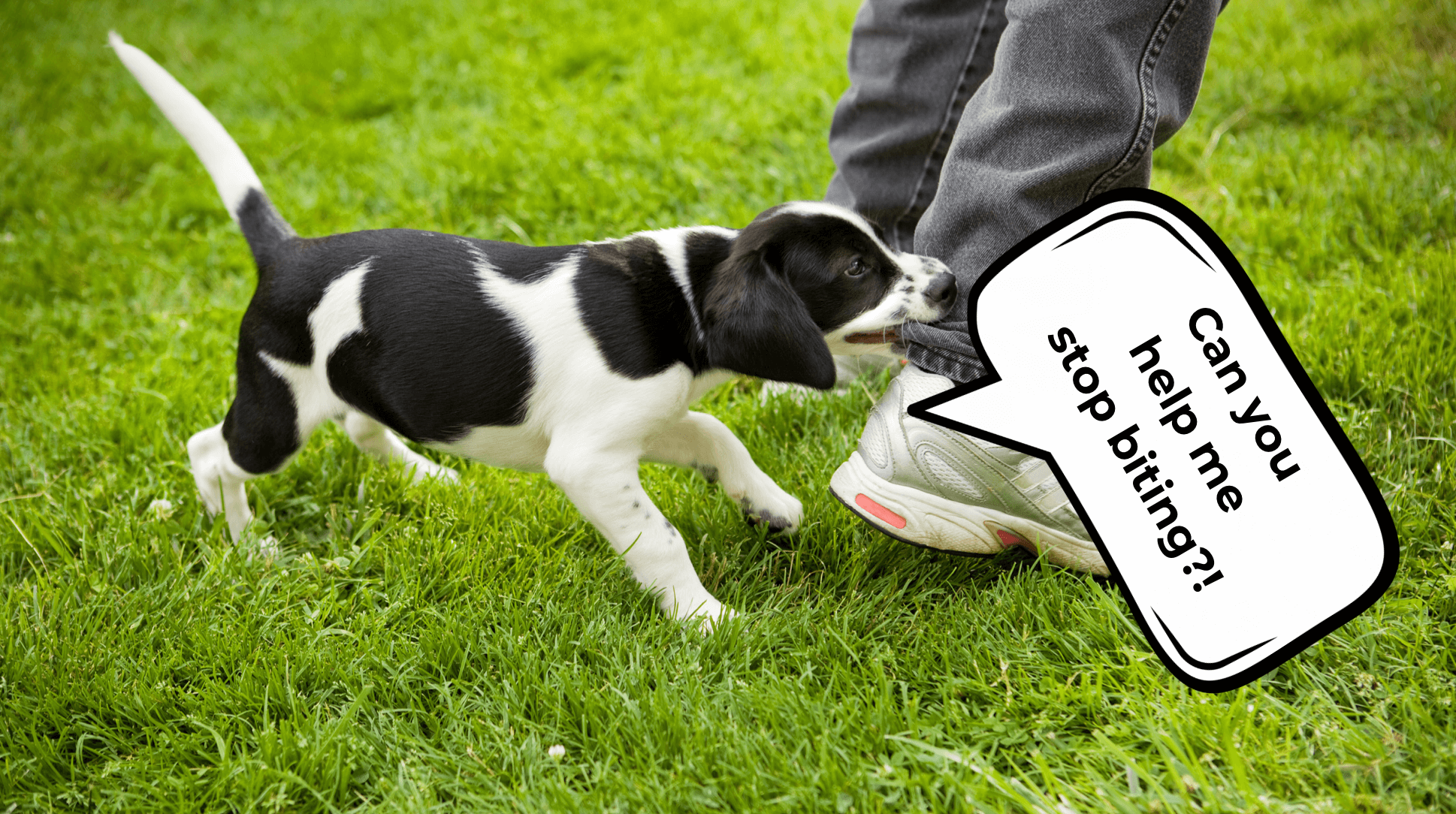
Is stopping puppy biting possible?
It's a common scenario: when puppies bite, their owners become unsure on what to do next. I understand it — when your sweet puppy starts biting, it's easy to ask, “Is there something wrong with my beloved dog? Will they outgrow this behavior or will this get worse?”
Dealing with your puppy's biting can be overwhelming, and I'm here to help. This blog (and my podcast) aims to help puppy parents like you navigate your pup's biting behavior and learn the steps to minimize this behavior altogether.
Let's start.
Key Takeaways
- Leadership is Key: Puppies have a natural instinct to follow a leader. By establishing yourself as a calm and assertive leader, you provide your puppy with security and guidance, reducing their need to bite out of insecurity or a desire to assert themselves.
- Redirection and Boundaries: When your puppy bites, it's crucial to redirect their attention to appropriate chew toys and consistently enforce boundaries. This teaches them that biting is not an acceptable way to interact with you.
- Understanding the Root Cause: Puppy biting can stem from various reasons, including exploration, teething, attention-seeking, excitement, anxiety, or lack of bite inhibition. Understanding the root cause of your puppy's biting behavior allows you to address it more effectively with tailored strategies, such as providing appropriate chew toys, socialization, or professional training.
Table of Contents
Why Puppies Bite: Top 6 Reasons Why Your Dog Is In a Biting Stage
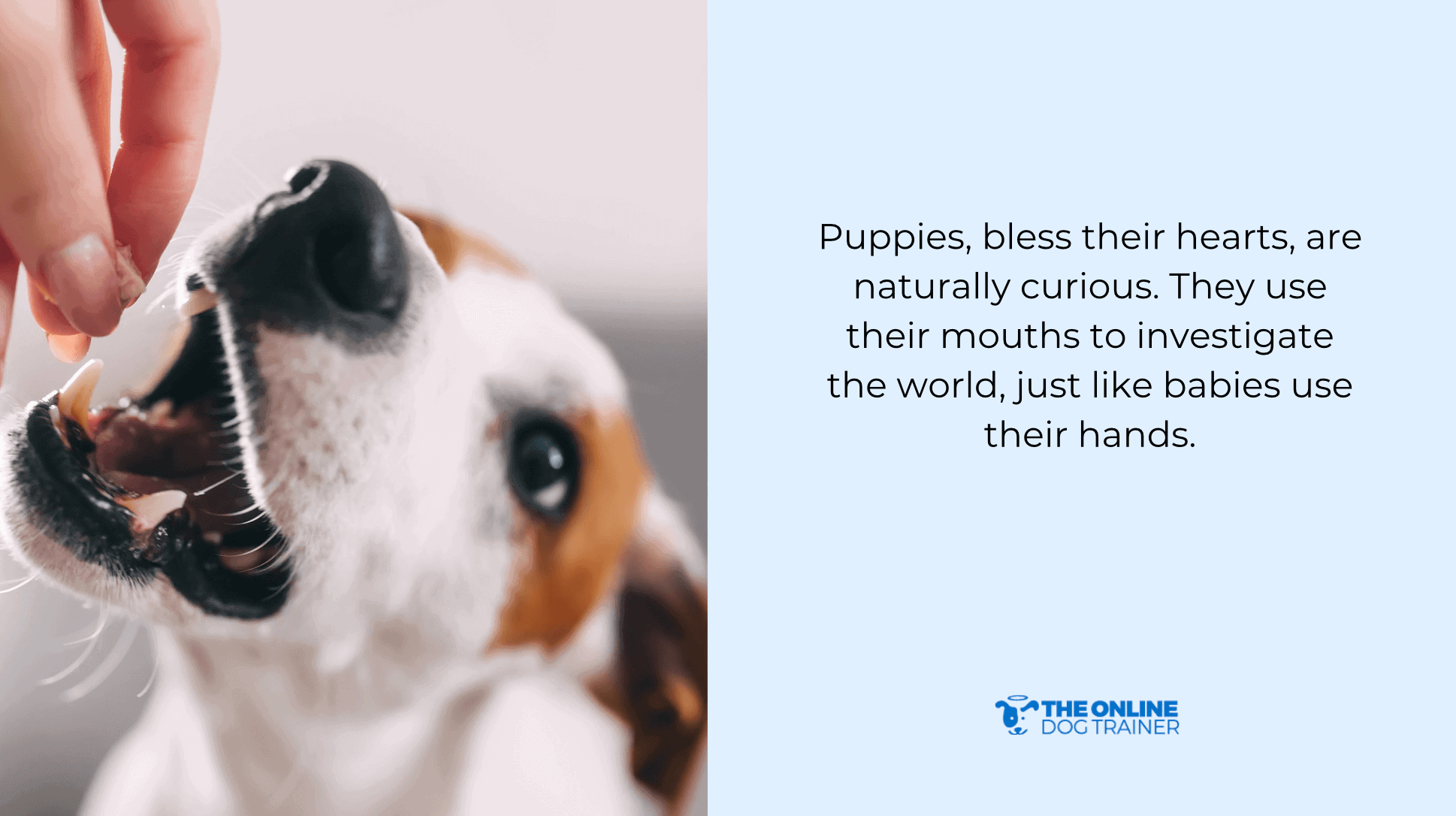
Your Puppy Uses Their Mouth To Explore Everything
Puppies, bless their hearts, are naturally curious. They use their mouths to investigate the world, just like babies use their hands. So, that nibbling on your fingers? It's often just playful exploration, not aggression.
They Are Teething
Just like human babies, your puppy goes through a tough time when those adult teeth start pushing through. A puppy chewing on random stuff needs help soothing its sore gums. So, offer plenty of safe chew toys and a bit of extra patience during this phase. Never tolerate your puppy's tendency to use your hand for chewing — even puppy teeth hurt! A tug toy or a safe chew toy is great for a puppy's sharp teeth.
Your Puppy Is Looking For A Way To Get Your Attention
A biting puppy can be craving for your attention. Your puppy will try all sorts of ways to get your attention, even if it means they will mouth gently or do a little nip here and there! It's like they're saying, “Hey, look at me!” So, make sure to give them plenty of positive attention for good behavior.
(You can learn more about handling your puppy and adult dogs' need for attention here.)
Your Puppy Expresses Excitement Through Biting
Puppies are bundles of energy, and sometimes that excitement overflows into playful nips. They get so caught up in the moment that they forget their manners. It's like a friendly game of tag that gets a bit too boisterous!
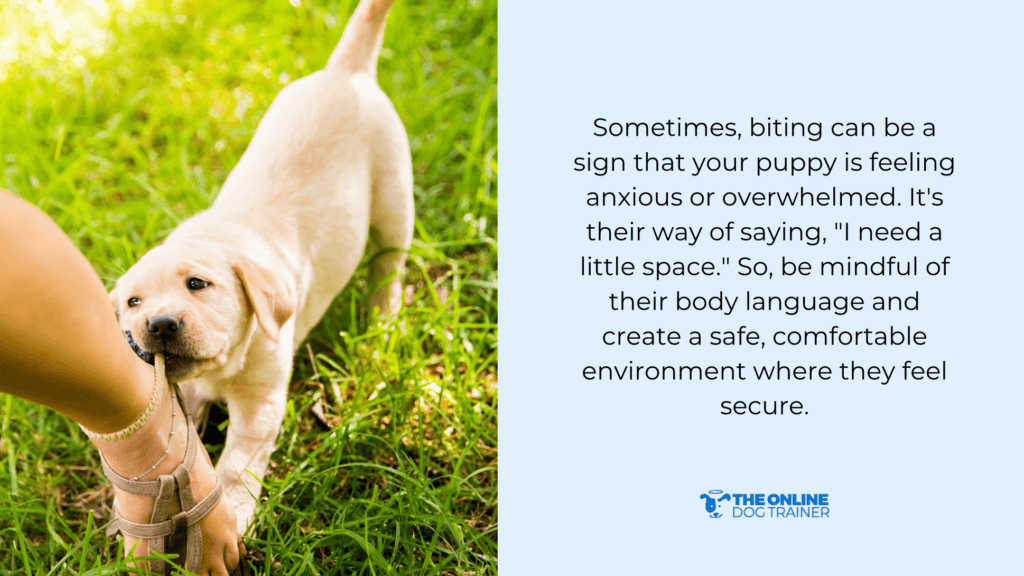
They Are Anxious
Sometimes, biting can be a sign that your puppy is feeling anxious or overwhelmed. It's their way of saying, “I need a little space.” So, be mindful of their body language and create a safe, comfortable environment where they feel secure.
They Have Not Learned Bite Inhibition Yet
Puppies learn how to control their bite strength through interactions with their littermates and mom. If they missed out on that early socialization, they might need a little extra help understanding how to play gently. For a puppy who doesn't know about bite inhibition, play biting can become extreme. Think of it like learning a new game – it takes practice and guidance!
They Are Reactive
Your puppy's world is a whirlwind of new sights, sounds, and smells. It's all a bit overwhelming, really! And sometimes, that overstimulation can lead to reactive biting.
Think of it like this: your pup's still learning to regulate their emotions. They might get startled by a sudden noise, feel a bit anxious in a new environment, or simply get overexcited during play. And in those moments of heightened emotion, their instinct might be to nip or bite.
It's not aggression, mind you. It's more like an impulsive reaction, a way of saying, “Whoa, that's a bit much for me right now!”
JOIN MY FREE REACTIVITY CLASSUnderstanding Puppy Biting Behavior: When Your Puppy Mouths Their Sibling
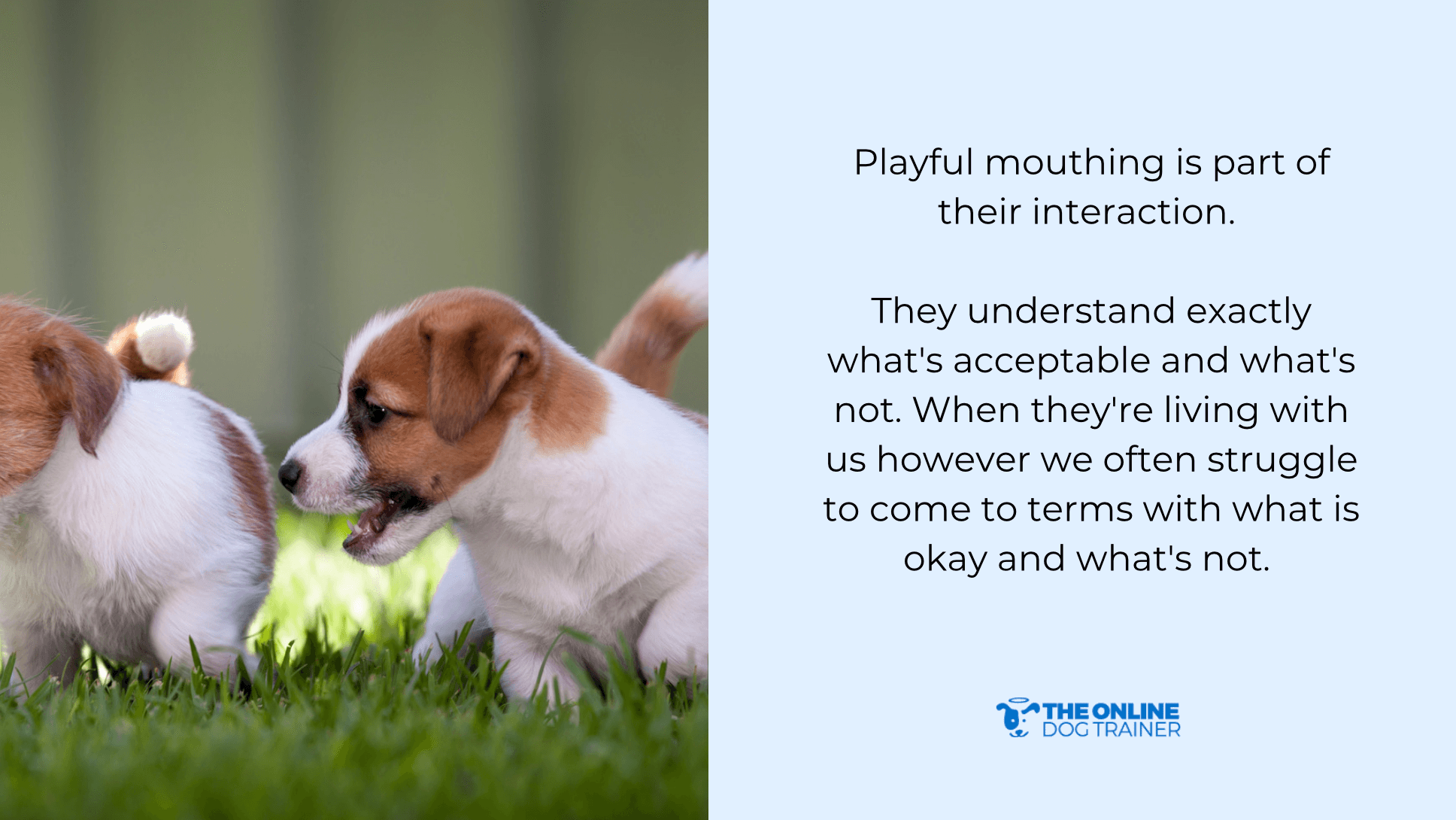
In nature, it's so natural for puppies to mouth their siblings. Playful mouthing is part of their interaction.
They understand exactly what's acceptable and what's not. When they're living with us however we often struggle to come to terms with what is okay and what's not.
Some dog owners dismiss biting behavior as “part of a puppy's growing up years” and do nothing about it.
I sometimes find myself working with people whose homes have been turned into fish bowls where their puppy is like a piranha fish trying to bite anything that moves!
One of the top reasons why puppies go on a biting rampage is because leadership and boundaries around biting are not set in place.
What do I mean by this?
You Deal With Puppy Temper Tantrum and Excessive Biting Because Your Puppy Doesn't See You As The One In Charge
Think of it like this: in a dog's world, there's always a leader. If you haven't established yourself as the calm and assertive pack leader, your puppy might try to take the reins (or, should we say, the leash!). They might think, “Well, if no one else is going to lead, I guess I'll have a go!” This can manifest as frustrating temper tantrums and excessive biting.
LEARN THE RULES OF LEADERSHIP FOR FREEYou Have Not Yet Taught Your Puppy What Is Acceptable and What Is Not
Puppies are like little sponges, eager to learn about the world. But they need our guidance to understand the rules of the human pack. If they haven't been taught that biting is unacceptable, they'll simply continue to use their mouths to explore and communicate. It's up to us to set clear boundaries and teach them appropriate behavior.
Teach your puppy these boundaries and rules to nip future aggression in the bud.
One of my best selling courses, the Puppy Coach, is created to help puppy owners deal with challenging dog behaviors like biting. You can check it out here.
What To Do To Stop Your Puppy's Biting Behavior
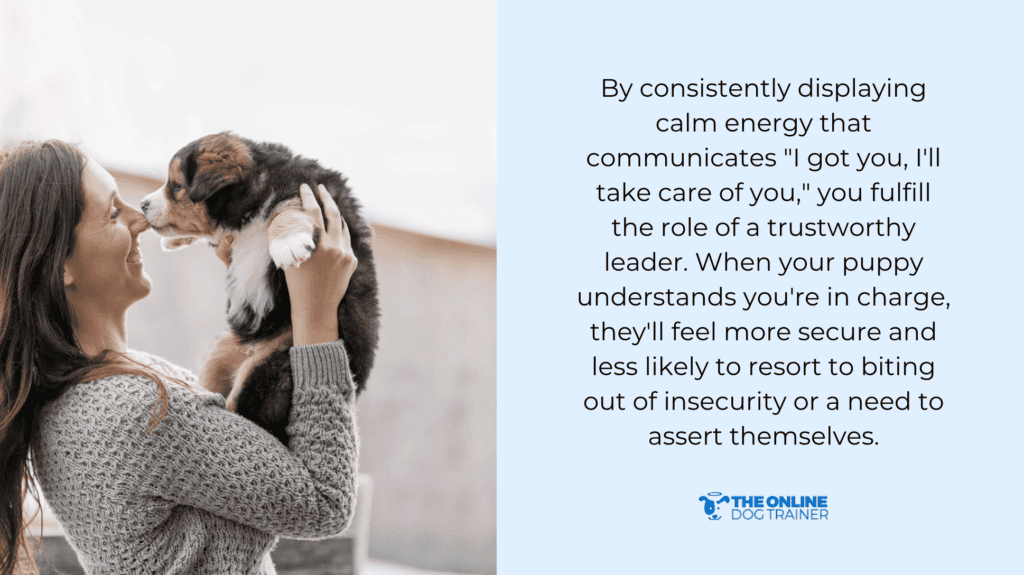
#1: Establish Yourself As The Gentle, Reliable Leader
Dogs are social animals with a natural instinct to look for a leader within their pack.
By consistently displaying calm energy that communicates “I got you, I'll take care of you,” you fulfill that role. When your puppy understands you're in charge, they'll feel more secure and less likely to resort to biting out of insecurity or a need to assert themselves.
GET THE DOG CALMING CODE FOR FREE#2: Help Your Puppy Overcome Reactivity
Reactivity in puppies often stems from a lack of socialization, fear, or anxiety. What could be nothing for some can actually be a trigger for a reactive puppy who resorts to biting when triggered.
To address this, focus on creating positive associations with potential triggers. Gradually introduce your puppy to new sights, sounds, and experiences in a controlled environment, pairing these exposures with rewards and praise. Teaching calming signals, like ‘look away' or ‘sniff the ground,' can also empower your puppy to communicate their needs without resorting to biting.
You can also join my free webinar on puppy reactivity to learn more about this.
FREE REACTIVITY WEBINAR FOR PUPPIES#3: Set Boundaries and Rules in Place
Clear communication is crucial for preventing biting. When your puppy bites, calmly and consistently redirect their attention to an appropriate chew toy or withdraw your attention altogether. This teaches them that biting is not an acceptable way to interact with you. Consistency is key – every time your puppy bites, react in the same calm, assertive manner. This predictability helps them learn the rules faster.
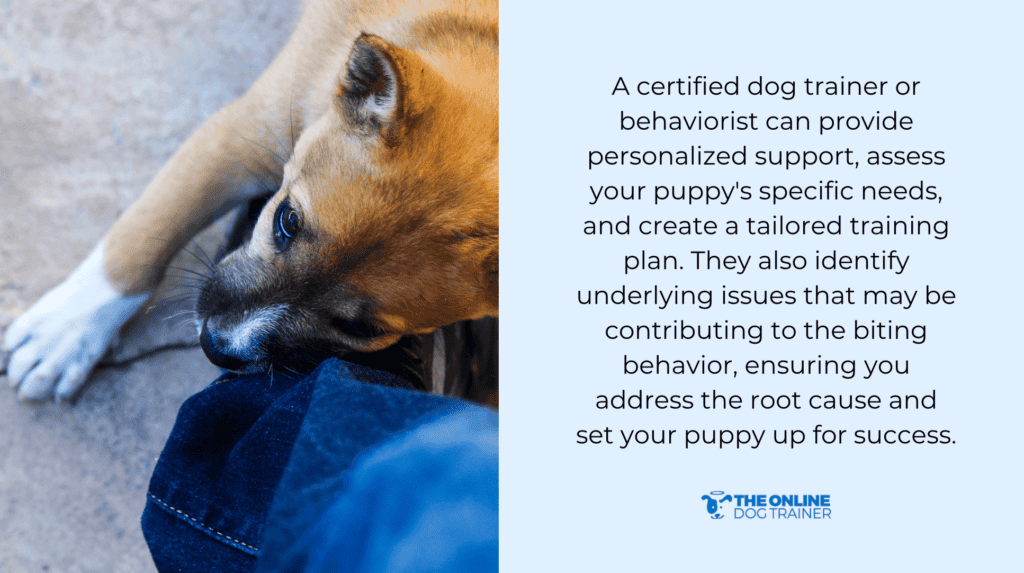
#4: Ask Help From A Puppy Behavior Professional
Sometimes, despite our best efforts, we need a little extra guidance. A certified dog trainer or behaviorist can provide personalized support, assess your puppy's specific needs, and create a tailored training plan. They can also help you identify any underlying issues that may be contributing to the biting behavior, ensuring you address the root cause and set your puppy up for success.
This approach maintains the friendly, approachable tone while providing more concrete information and actionable advice. It's like having a knowledgeable friend who not only understands dog behavior but also knows how to explain it in a clear and helpful way.
Listen To My Podcast On Puppy Biting: What You'll Learn
In this free podcast, I cover 3 key topics on How to stop puppy biting and mouthing.
Before we get stuck when it comes to the question of “What should a puppy chew?”… then just click the button below to download my PDF of the 11 Favorite Puppy Chew Toys (that don't cost the earth!):
Download: my 11 favorite puppy chew toys
1. How Biting & Mouthing works in nature
Here we take a look at how it all works in nature and why we are making things hard for ourselves with some very old school training methods. If you have a young puppy then you may well discover that you have been told to set your puppy up to fail without even realising it.
2. Summary of the solution
The thing about stopping puppies biting and mouthing is that it's actually very simple when you know how. There is no need for screaming and shouting and certainly no need for tapping or smacking your puppy. In fact, these things will often only make things worse. A calm approach with a simple yet effective consequence, if they continue, is all you need.
JOIN MY FREE REACTIVITY WEBINAR3. Why things go wrong
Here I cover off some of the most common reasons why things go wrong and explain exactly what to do to turn it around, including the missing piece of the jigsaw… The one thing that every puppy owner needs to do to put an end, quickly and easily, to all that biting and mouthing.
GET THE DOG CALMING CODE FOR FREEUnderstanding Your Puppy's Behavior: What Really Works For Your Dog
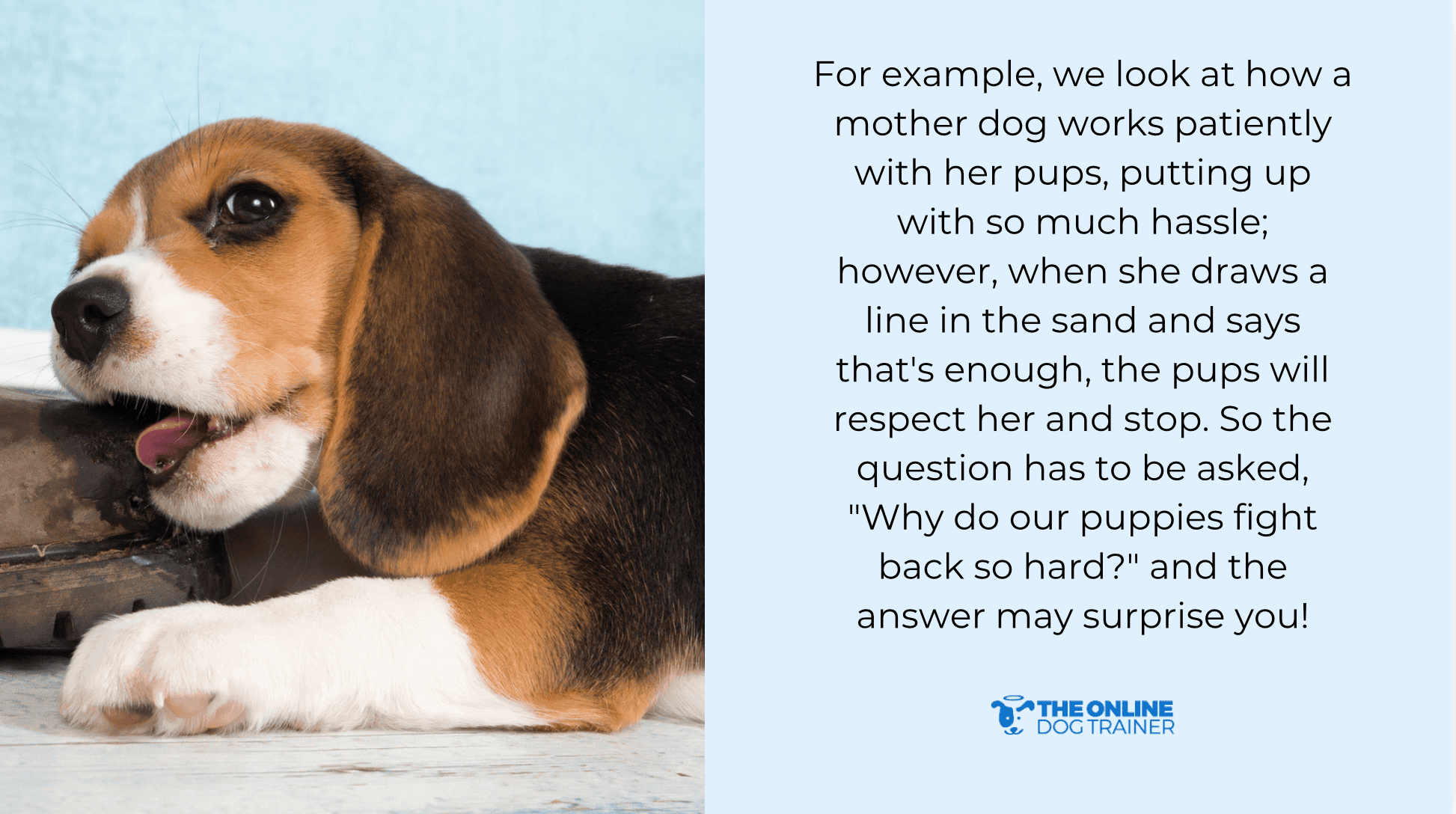
As well as covering all the practical steps we need to take, we also take a more in-depth look at why we're really running into trouble. For example, we look at how a mother dog works patiently with her pups, putting up with so much hassle; however, when she draws a line in the sand and says that's enough, the pups will respect her and stop. So the question has to be asked, “Why do our puppies fight back so hard?” and the answer may surprise you!
I Answer Puppy Biting FAQs On My Podcast
At the end of the podcast I answer a selection of your questions and show you where you get a whole load more information on stopping this and many other issues if you want more help. Of course this puppy problem is completely covered off in my video training website, theonlinedogtrainer.com.
If you're struggling with puppy mouthing and biting or have an older puppy or dog and are in trouble then help is here, enjoy the podcast!
If you're looking for a more concrete solution that will help you sooner rather than later, I invite you to check out how I've trained over 88,000 with a kind, gentle approach.
FREE REACTIVITY WEBINARFrequently Asked Questions
Why is my puppy biting so much?
Puppies explore the world with their mouths. Biting is often play, teething, or a way to get attention. It's rarely aggression. Understanding this helps you respond calmly and effectively.
How do you discipline a puppy who is biting?
- Never use physical punishment. This can damage your relationship and lead to fear-based behaviors.
- Redirect and reward. When your puppy bites, redirect their attention to an appropriate chew toy. When they engage with the toy, praise and reward them.
- Use “Ouch!” or a high-pitched yelp. This mimics how puppies communicate with each other. It often startles them and interrupts the biting.
- Withdraw attention. If yelping doesn't work, calmly withdraw your attention. Turn away, stand up, or leave the room for a short period. This teaches them biting ends the fun.
How do you train a puppy not to bite you?
- Teach bite inhibition. Allow gentle mouthing, but react strongly (“Ouch!”) to hard bites. This teaches them to control their bite strength.
- Provide plenty of chew toys. This satisfies their natural urge to chew and gives them an alternative to your hands and feet.
- Enforce calm behavior. Reward calm behavior with praise and gentle petting. This encourages them to associate gentleness with positive experiences.
- Socialize your puppy. Interactions with other puppies and dogs teach them appropriate play and bite inhibition.
At what age do puppies stop biting?
Most puppies grow out of the intense biting phase around 6-9 months old once they have their adult teeth. However, it's crucial to address biting early to establish good habits.
How do I get my puppy to stop biting ASAP?
Consistency is key. Consistently redirecting, withdrawing attention, and rewarding appropriate chewing will help your puppy learn faster.
Do puppies naturally stop biting?
To some extent, yes. As puppies mature and learn social cues, they naturally become less mouthy. However, training is essential to ensure they understand human boundaries and develop good bite inhibition.
Additional Tips:
- Manage the environment. Puppy-proof your home to minimize opportunities for biting inappropriate objects.
- Be patient and understanding. It takes time and consistency to teach a puppy not to bite.
- Consider professional help. If you're struggling, a certified dog trainer or behaviorist can provide personalized guidance.
Remember, gentle leadership is about guiding your puppy with clear communication and positive reinforcement. By understanding their needs and setting consistent boundaries, you can help them learn appropriate behavior and develop into a well-mannered dog.
JOIN MY FREE REACTIVITY WEBINAR
~Doggy Dan 🙂


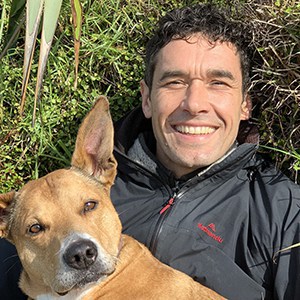

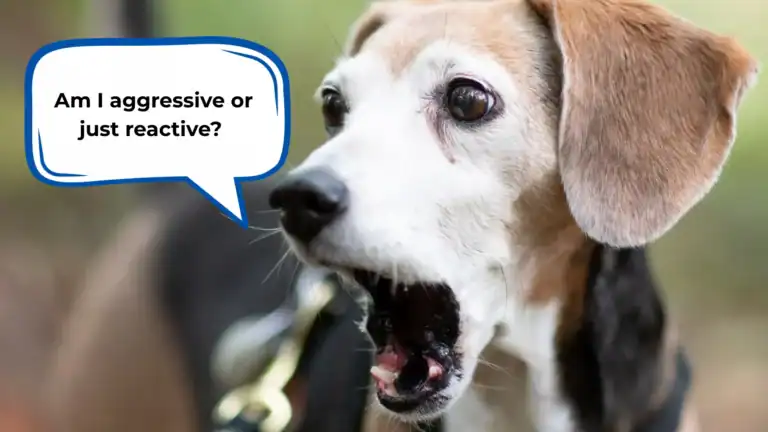
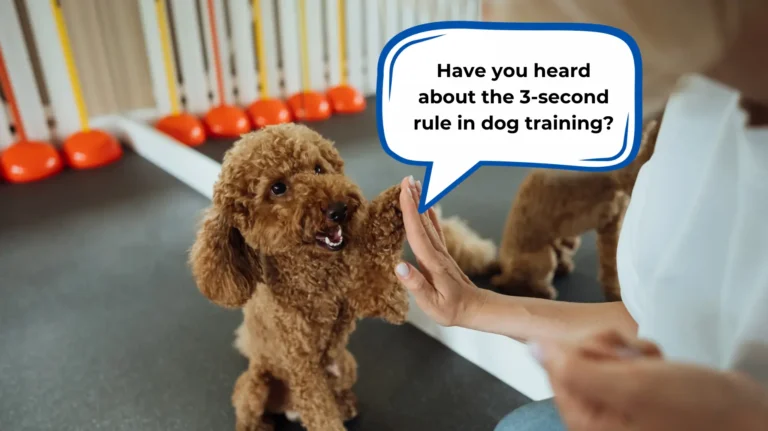
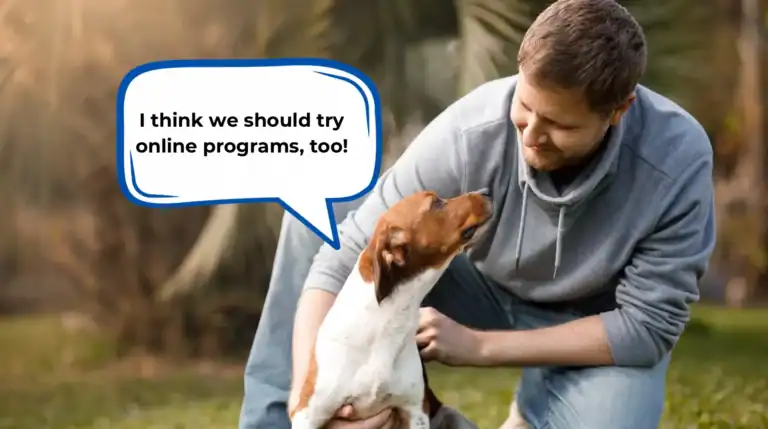
16 Responses
Having a difficult time with my Pyradane 11wksold biting me. I don’t know what to do
Keep hearing different things to do. I don’t want to yell at him
Hi Debbie, the most effective way in overcoming puppies from mouthing/biting is for you to respond calmly and consistently…no yelling required! If you add energy to the situation then your puppy will become more excited or see it all as a bit of a game….which means the behaviour will continue. Try the techniques I mention in my Blog but we also have a very comprehensive section on Mouthing & Biting in my ‘Perfect Puppy Program’, which you can find on my website…TheOnlineDogTrainer.com Best, Doggy Dan
I don’t have an iPhone to listen to your podcasts but I would really love to know how I can effectively get my 3 month old puppy to stop biting us! Thanks for your time.
Heather
Hi Heather…..my website TheOnlineDogTrainer.com has a very detailed section about raising calm and well behaved Puppies. One of the topics we cover is mouthing/biting…maybe take a quick look…its a $1 trial for 3 days…all the best Doggy Dan
Hi I have a 5 month old pit bull that doesn’t know how to be gentle when Playing how can I calm him down. Enough so he can have more fun playing.. As it is no other pups or my cats want to play cause of his rough housing play
Hi Tracy,
It’s really normal for young dogs to need a little help learning how to play with others correctly. And so if you think your dog is getting a little too rough then calmly intervening is a good idea. I generally advise to take the dog gently by the collar and hold them still until they calm down a little. You can clip a leash on if your dog is not all that happy about you holding him by the collar but it’s best not to say too much to him, just let your calm actions help him relax. It may take a few reminders but if you are consistent at the point at which you intervene then you will show him how you expect him to behave, which will then allow him to use some self-control…..the best form of control there is! If he refuses to calm down then placing him in a room on his own for a few minutes will let him know that he has done the wrong thing. Thanks for posting your question, Doggy Dan
Hi doggy Dan. Do u have videos for puppies, biting and jumping and chewing. I am struggling . Please help
Hi Susan,
My website TheOnlineDogTrainer.com deasl with these issues and has a very comprehensive Puppy Training scetion…maybe take a quick look…its a $1 trial for 3 days…all the best Doggy Dan
I understand these training methods, but mine is a little different. We have a rescue that is a 1 year old Lab. We have had him for 6 months. Our home based business in downstairs with the door at the bottom of the steps. Whenever we go up or down Gus nips at heals, arms legs and even butts. The only thing that words somewhat is I hold a newspaper in my hand and he hesitates (not stops though). Don’t want to have him fear me, but do want him to stop. Like the ones you mentioned here, he draws blood and even tore my pants.
Hi Karen,
I agree, it is far better to overcome unwanted behaviour by encouraging your dog to use self-control rather than have them fear a negative response. One thing that is really important when this behaviour happens is not to tell your dog off or make a big fuss as it cam be counterproductive. Actions speak far louder than words here and if you get upset then your dog will be less likely to calm down and the behaviour will linger.
I would encourage you to practice walking up and down the steps but have your dog on a leash with you when you do. If he tries to nip you then stop and calmly hold him still by the collar, we call this a Calm Freeze, or shorten the leash and hold it at arms length from you. When you feel your dog relax and stop trying to nip you you can move off again but repeat the technique if required. You may need to be prepared to do this a few times but the more you practice it the quicker your dog will learn that this behaviour no longer works for him.
Hope that helps! All the best, Doggy Dan
Hi Dan, I have a 12 week border collie who bites to draw blood I have tried everything on the internet and I am at my wits end and need help. I say no firmly And he goes for the face he gets aggressive. Any advice? He has tons of toys and has time out so I do distract but he really hurts..
Hi Bev, one thing I have found is that the biting can often be at its worst at around 12 weeks so hold tight and ride the storm. Whatever you do it sounds like you have a lively one there in terms of a puppy personality! So I recommend you pick up on the warning signals and get a serious training program in place ASAP… such as Theonlinedogtrainer.com
In terms of a solution there is a lot of ground work and foundation to put in place if you really want any training to stick and have meaningful impact however the “training” I would do is simple. Use a short line so you can catch your put, and use timeout. Stay silent as you do it. Puppies and dogs do not like timeout. It is like putting a calm and consistent consequence in place with a child. You bite my face – you go in timeout. He will know exactly what he is doing. Do consider the $1 3 day trial at Theonlinedogtrainer.com for access to my complete training program it will save you a tonne of trouble in the long run. Best regards Doggy Dan
Hi.i have a 6 month old rescue cross. He’s stated to bite mainly me but my young sons too. I can just b sitting quietly and he will do it or after a walk. If I turn away and ignore it he bits my bum and legs and when I try and get him in time out, I get bitten even harder. I’m covered in bruises and scratches. I’m worried that he’s gonna really hurt me or my sons soon. He doesn’t do it to my husband. I do everything from feed him to walk him etc. Help
Hi Lisa. Biting/Mouthing is a behaviour that does need to be addressed correctly and often our natural reaction to tell the dog off is counterproductive. It sounds like you are aware of time-out but if you are trying to give your dog one and he is becoming more agitated then there is another option. One thing I would say is that sometimes dog’s don;t like being lead to time-out by the collar and so attaching a leash is a better option. If your dog bites/mouths you, and you can’t take him to time-out, then immediately have everyone leave the room he is in and close the door behind you. This is still the same consequence as time-out, he loses everyone as a result of the behaviour. It’s also a very handy one for small children to do as it is safe and means they don;t have to touch the dog at all. After a few minutes you can return to the room again but pay no attention to your dog until he is calm and has left you alone for a few minutes, you can then call him over for a pat/fuss if you want to. Leaving a short-line attached to his collar can make delivering a time-out much easier if his biting/mouthing is a common behaviour. My website TheOnlineDogTrainer.com also shows you very clearly how to overcome this…maybe take a quick look if you need some more help…its a $1 trial for 3 days…all the best Doggy Dan
Hi what about when your taking your dog for a walk and the dog attack your jacket and biting your hand .. it hard to take him to time out when your in the middle of a walk.
thanks
Sylvie
Hi Sylvie,
this is a great example of where you really need to establish some respect inside the house before you leave! It reminds me of people who go to a restaurant with young children and have no control over them, the restaurant is not the place to try to train them or gain that control. Once you have more control your dog will not do this. If they do there are some simple things that you can try however until you have established yourself as the pack leader they are unlikely to work well. What size and age is your dog I wonder? sounds like they are acting like a puppy but much bigger…which makes me think you really should take a look at my site for $1. http://theonlinedogtrainer.com Firstly I would find out WHY? your dog is biting you, what they want. There will be a reason and then we can work from there… I like to understand where the dog is coming from before I just try to “stop” the behavior as it can alter our approach. Hope that helps…Doggy Dan